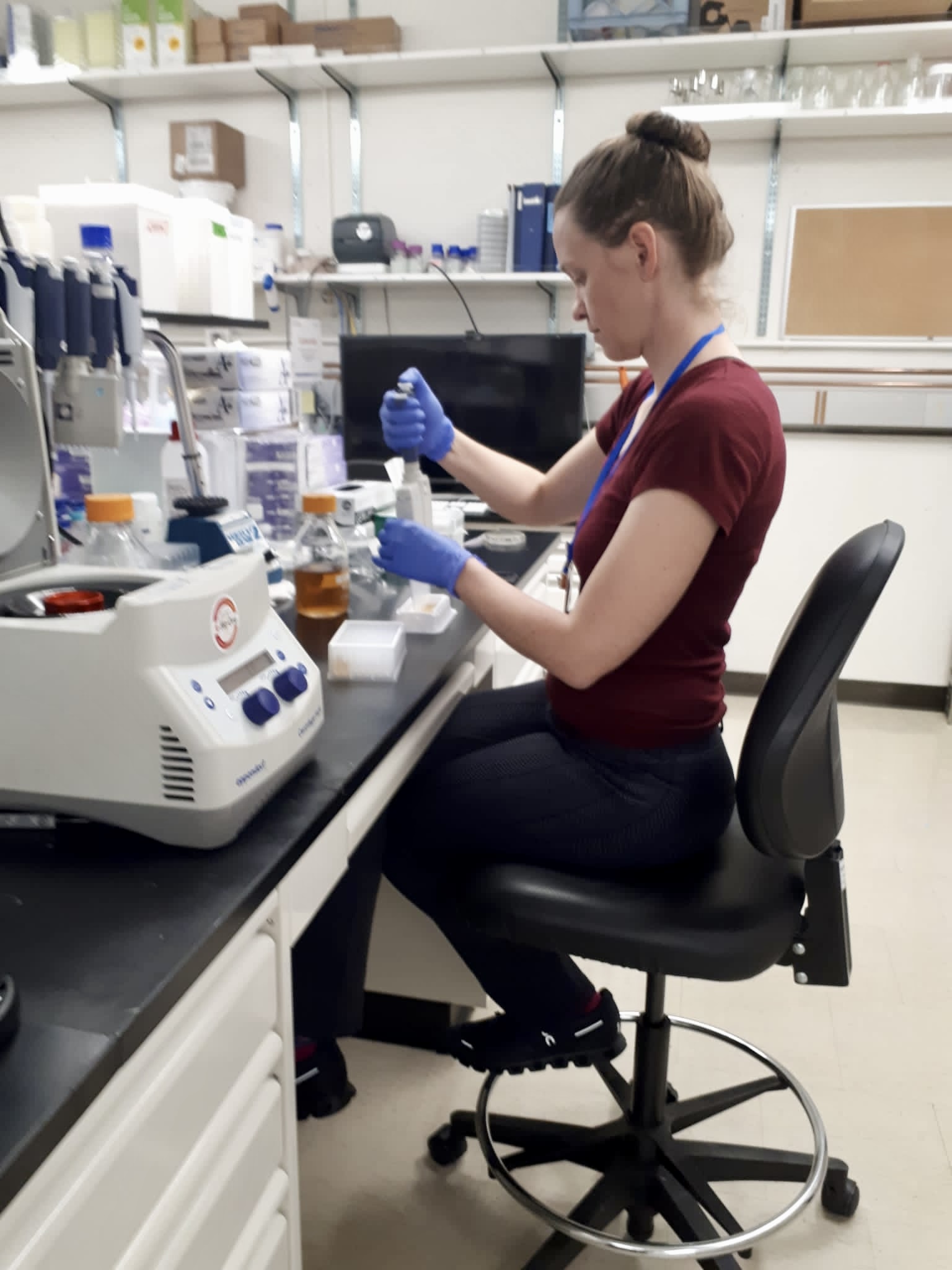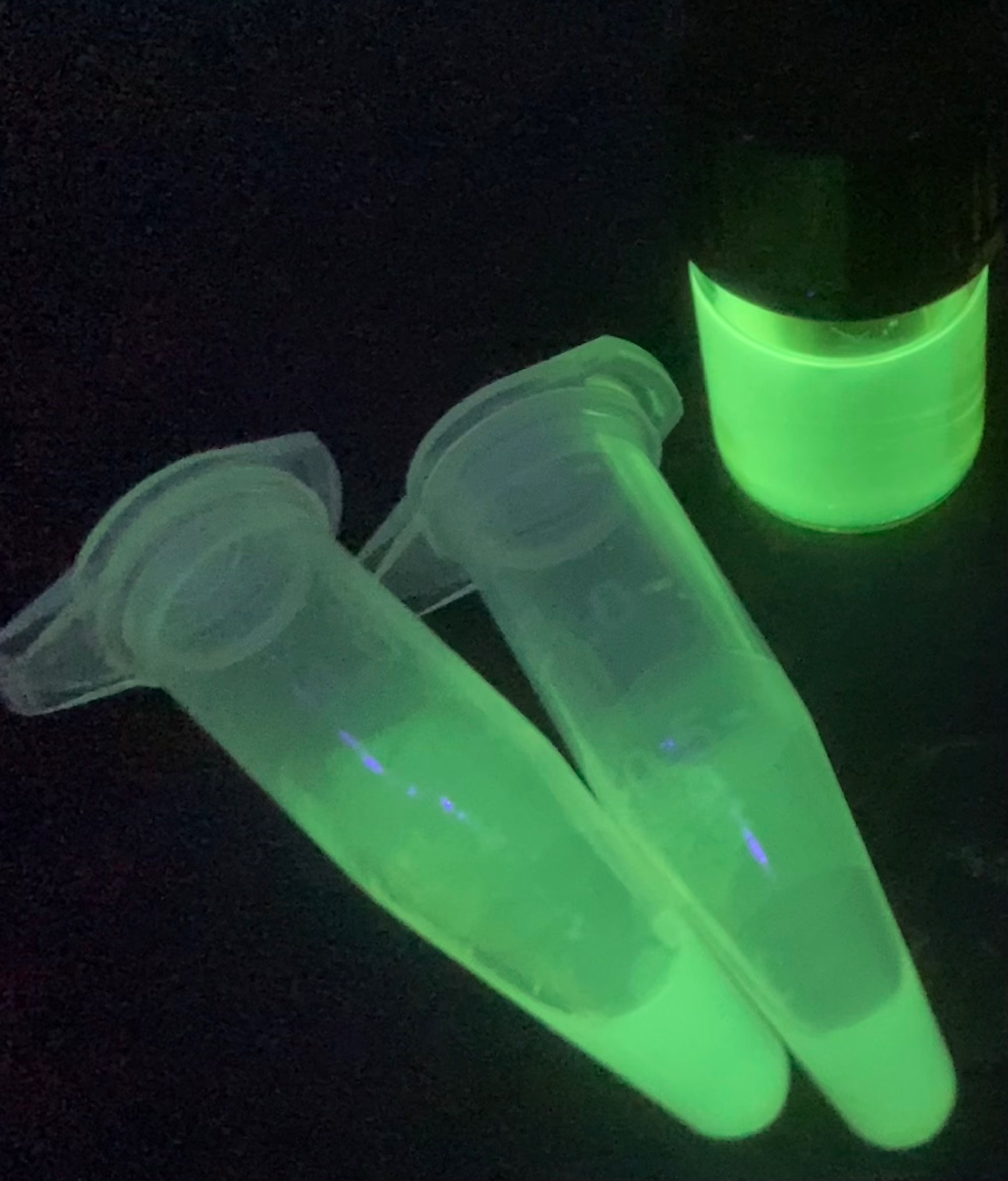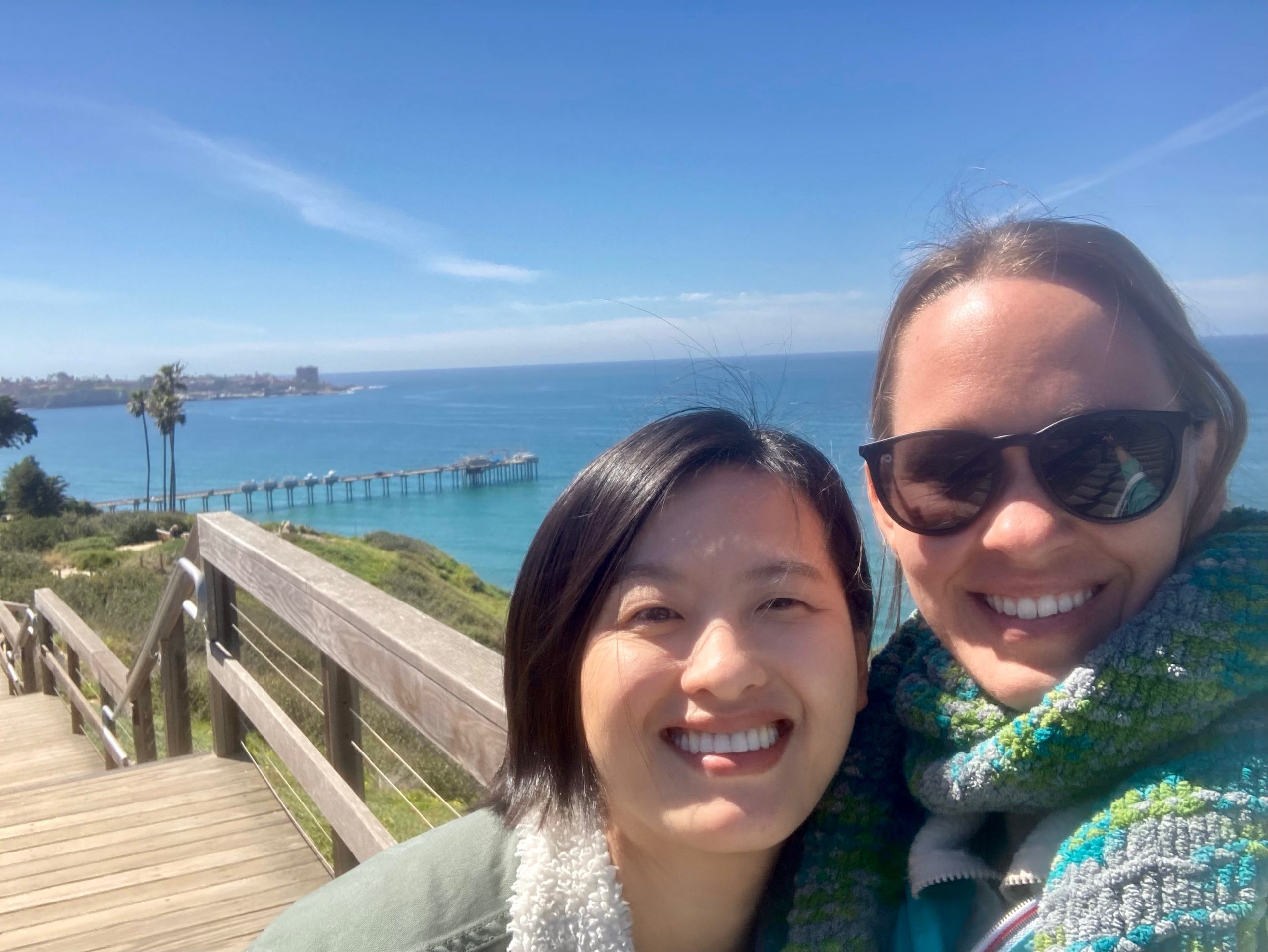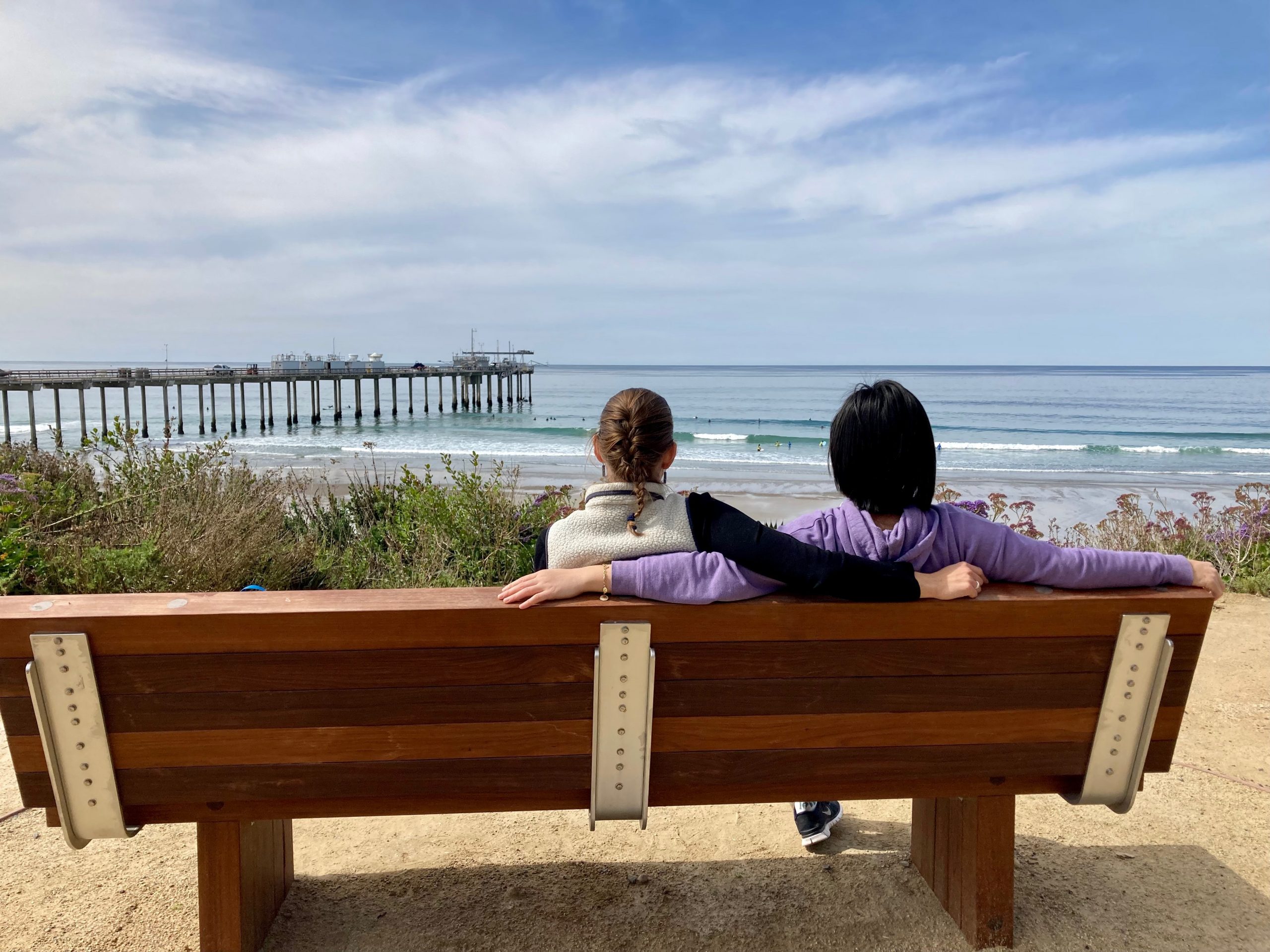By Ewaldo Leitao
Brittany Sprecher finished her PhD in December, 2020, and soon after she moved to Germany to continue her investigations on phytoplankton molecular biology. In her PhD, Brittany was able to develop molecular techniques to begin to help explain the complexity of dinoflagellates. Dinoflagellates are small eukaryotic cells that can photosynthesize and produce their own energy or, sometimes and, be heterotrophic, eating even smaller cells such as bacteria. Their complexity does not end there. Their genomes are astoundingly large, varying from one third up to 90-fold that of the human genome size. This complexity translates into lots of unknowns on their molecular characterization, that Brittany has bravely shed some light on during her PhD.
Ewaldo: Thank you so much for agreeing to be interviewed. First, can you give me a brief explanation of your work conducted while in UConn?
Brittany: I had the great opportunity to work under Prof. Senjie Lin and Prof. Huan Zhang. My work primarily involved developing transformation methods for dinoflagellates, a complex group of organisms. Additionally, I utilized transcriptomics to gain insights into the molecular characteristics of a recently discovered dinoflagellate. It's fascinating how much we still have to learn about these organisms, as many of their genes remain unknown in terms of their functions. Even key pathways like toxins and bioluminescence, which have significant ecological importance, have missing or poorly understood genes. To address this knowledge gap, I focused on establishing a method to introduce foreign DNA, such as the green fluorescent protein or an antibiotic-resistant gene, into dinoflagellates with the goal that the cells would take up and express the introduced proteins.
Ewaldo: This is super interesting. So where did you go after your PhD? And how did the work at Uconn allow you to get there?
Brittany: After obtaining my PhD, I had the opportunity to do a Postdoc in Germany, which turned out to be an incredible experience. Interestingly, my focus remained on method development, but this time I shifted my attention to diatoms who are endosymbionts of dinoflagellates. The transformation methods for diatoms were comparatively more straightforward, allowing me to complete the method development in just one year, whereas it took four years for dinoflagellates. I believe that the valuable experiences and challenges I faced during my PhD greatly contributed to my success during the Postdoc. The obstacles we encounter along the way ultimately shape us into stronger scientists with enhanced troubleshooting abilities.
Ewaldo: This seems like a great experience, to do your Postdoc abroad.
Brittany: Absolutely! It was truly fascinating to observe the research and graduate school culture in Germany. One aspect that particularly stood out to me was the tradition of having lunch together as a lab. Initially, I found it a bit strange, feeling the urge to quickly return to work. However, I soon realized the immense value of these interactions. During these lunch sessions, we would engage in discussions about science, troubleshoot any issues we were facing, or simply delve into various aspects of life outside of work. This time proved to be exceptionally productive and nurturing for our mental well-being, fostering collaboration and support among lab members. The experience of sharing meals together truly enhanced our ability to collaborate and assist one another with our projects. On the whole, my time in Europe was an enriching experience that expanded my scientific network and broadened my perspective on research.
Ewaldo: Indeed. What are you up to these days?
Brittany: Currently, I have the privilege of working at the University of California, San Diego, on an NSF Postdoctoral Fellowship in Biology. I'm actually continuing one of the research chapters from my PhD, focusing on a dinoflagellate species that exhibits native green fluorescence. My project involves utilizing analytical chemistry techniques to determine the structure and potential function of this fluorescent molecule. While analytical chemistry is slightly outside my expertise, I am fortunate to be part of an institution that fosters collaboration, and I have been able to connect with several supportive chemists who are aiding me in this discovery. Additionally, I'm conducting laboratory experiments to identify the conditions under which the green fluorescence changes, and I'm collecting samples from the Scripps Pier to assess the prevalence of this blue-green fluorescence among dinoflagellates locally and hopefully globally by the end of this fellowship.
Ewaldo: Incredible expertises. So what are your next steps? Do you have anything in mind?
Brittany: I'm deeply passionate about dinoflagellates and diatoms, and my aim is to continue delving into these fascinating organisms. Consequently, I will actively pursue academic positions that allow me to further explore and contribute to this field. Additionally, I plan to continue applying for fellowships and grants that can support my research endeavors. My ultimate goal is to make meaningful contributions to our understanding of these organisms and their ecological significance.
Ewaldo: Since you mentioned the struggles of a PhD student, do you have advice for grad students and / or early career?
Brittany: One of the most valuable pieces of advice I received before starting my PhD was to invest time in getting to know my cohort. I cannot stress enough how important this has been for me. The support, camaraderie, and collaboration that I have shared with my cohort has been invaluable in navigating the ups and downs of graduate school. Additionally, I highly encourage graduate students and early career scientists to actively seek out and apply for fellowships and grants. These opportunities not only provide financial support but also open doors for networking and collaborations. Lastly, remember that collaboration is key. Engage with your peers and colleagues, seek opportunities to collaborate, and leverage the collective knowledge and expertise around you. Together, we can accomplish so much more than we can individually.
Ewaldo: Finally, what are your hobbies?
Brittany: In my free time, I absolutely love surfing. Living in California provides me many opportunities to ride waves, and it's always a special experience when I find myself sharing the ocean with playful dolphins or witnessing the graceful dives of brown pelicans in search of food. I am also incredibly lucky to be reunited with Dr. Lingjie Zhou, who has been an incredible support in my life. It has been wonderful to spend time with her again both within the academic setting and in our personal lives.



